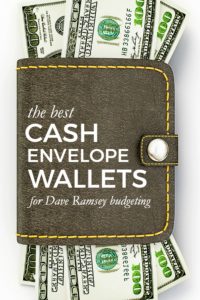
A few years back I launched a reader survey to see how I could serve all of you best. I thought you might want some help planning meals, or learning new grocery shopping savings strategies, or how to save money online.
Boy, was I wrong. Want to know the common thread expressed throughout the survey? You want help managing your money.
Many of you actually seem desperate for help. Some of you have lost hope that your financial life can be different. You see yourself as a pawn in this money game. And many of you sound like a victim. Your expenses, your income, your life is happening to you and you have no control.
And I get it. I really do.
My husband and I were sitting where some of you are currently at in 2006. I was oblivious about our financial situation (ignorance is bliss) and Will was losing sleep every night wondering if that “thing” we bought would mean our mortgage wouldn’t get paid.
It was ridiculous — we had enough money. We were earning big airline miles by using our credit card for all our expenses and paying it off every month. But there was still a real and persistent fear that all could come crashing down because we didn’t have a plan.
Just about the time Will was about to explode from the financial stress he was bearing (while I was spending money like a madwoman), we attended Financial Peace University. What we learned absolutely changed our lives. I’m not exaggerating one bit.
We learned how to make a plan for our money, how to modify that plan based on what was currently happening in our lives, and how to plan for the future in a way that gave us security, peace, and excitement about the legacy our family could leave.
We now have way less airline miles (we realized the folly in the “buy everything on credit so we can get some random perk” strategy) but we do have:
- Six months of expenses saved in our emergency fund
- A robust savings account that we use to pay for one-time, yearly, and unexpected expenses
- Two fully funded retirement accounts
- Zero arguments about money
- Zero debt
- Complete peace about where our family is going financially
What would your life look like if you were in a similar position?

We’re going to spend some time working through how you can gain control of your money and tell it who’s boss. But first, we need to have a family meeting and get some things sorted out. Remember the victim part? About how many of you feel like life is happening to you without your permission? Let’s talk through some of those reasons why you believe you can’t get ahead financially:
My spouse/partner spends too much money.
I’ve often thought about how awesome my life would be if everyone in my home just did what I told them to do all the time. Alas, no one is interested in living in the Republic of Angela, so I must figure out a different way of functioning.
What I do know for certain is very rarely is one person 100% to blame for any stinky situation. If you live with another adult in your home, that person will have an effect on your financial life.
Let’s get all Dr. Phil and say out loud, “The only person I can change is myself.” The only way you’re getting out of your financial mess is to admit you’re part of the problem. If you commit to making small changes in how you handle money, I bet your partner will be motivated to do the same.
If your spouse/partner truly holds all the responsibility for your financial mess, you don’t have a financial problem, you have a relationship problem.
If one person consistently sabotages any part of your family’s life, you all need help. There is no spending agreement or budget or envelope system or book that can solve the problem because the problem is not money. Something else is going on. I know of no rational, healthy person who is completely uninterested in working together with their partner to create a stable future.
If you’re in this situation, go get help from a marital or family counselor. Stat.
I can’t get ahead because of the government.
Yes, taxes. If we didn’t have to pay taxes, all of our problems would be solved, right?
The average person in the United States pays right around 25% of their income to the government in some form. (And many, many of you reading this right now actually pay much less than this.)
Considering what we get for the quarter we pay out of every dollar we earn, we’re getting quite a bargain — schools, roads, security, emergency services, and social services for people who really can’t fend for themselves (children, the truly disabled, and seniors).
Yes, the amount you pay in taxes could be used to alleviate some of your financial stress, but that’s simply not an option. It’s like saying, “If I was taller I could play in the NBA.” Riiiiight, but I can’t make myself taller, just like you can’t find a place on earth that doesn’t require you to contribute to the running of your government, so stop belly-achin’ and move on. Your problems won’t get better by blaming the government.
Unexpected expenses keep derailing my efforts at budgeting.
Dave Ramsey has a hilarious line that goes something like this: “Why is Christmas so often considered an unexpected expense? Christmas happens on December 25 every year.”
Too often things that feel like emergencies are actually expenses that you just failed to plan for. I’m not talking about your basement flooding or your kid breaking his leg. I’m talking about your car needs new tires, your son grows out of his sneakers, property taxes are due, or your furnace finally bites the dust. You knew you’d have to pay for these things at some point, but made the decision to not save for them.
In order to move these expenses from the emergency category to the “I’m saving up for it category” most of us will have to re-prioritize our spending. I realize that saving $50 a month to make sure there’s enough to pay for new tires next year is not nearly as much fun as going to the beach for the weekend or buying a new outfit or picking up the latest Call of Duty game, but that is absolutely what it takes to stop living paycheck to paycheck and jumping from one “emergency” to another.
I just don’t have enough time to manage my money well.
This was probably the biggest problem communicated in the survey. As with all things in life, the success of your endeavor is typically proportionate to the time you put into it. If staying fit is important to you, you’ll find time to exercise. If spending time with friends is important, your week will most likely include time to accomplish it.
I know that most of our lives are packed from morning until night, so that means that something’s got to give if you want to make your financial health a priority. You’ll have to carve out time to do it and that means, most likely, you’ll have to give one of your favorite activities up. At the beginning, it will be a fairly large time commitment but as you get a system set up, the kinks worked out, and a rhythm established it will take considerably less effort.
My husband and I have been at the auto-pilot stage for a number of years now. It takes about ten minutes every month to conference about our budget and then about an hour of his time to withdraw the cash and update his spreadsheets. We’re at a point now that not creating the monthly budget and living outside our system would take more time and effort than just continuing it.
I know that we all feel busy, but we’re definitely not using all the time we have as wisely and intentionally as we could (I certainly don’t). You might have to forgo watching some TV or playing video games or scrolling through Pinterest for a couple of nights a month when you start out, but I promise it will be worth it.
Here’s what I know for certain: Taking control of your financial situation is worth every ounce of sweat and arguing and spreadsheet making.
Yes, it will be sweaty. And there will be arguments. You will most likely feel like an idiot for a bunch of decisions you’ve been making.
But, there is hope. About 100% of you make enough money to pull this off.
I promise that you will be in a better position, regardless of your income or your expenses, if you go through the process of taking control of your money.
The benefits of living on a monthly budget are enormous: You will sleep better at night. The number of money fights will plummet. You will have freedom to spend money knowing that the water won’t be turned off. You will have a plan for your savings. You will be in control.
If you’re serious about taking control of your money and are willing to put in some serious work, you will absolutely change your family’s financial legacy.
Looking for more resources?
Find more budgeting posts HERE.
Follow Frugal Living NW on Pinterest!
Fantastic range of boards from best recipes and tips for frugal living to gardening and budgeting help.
This post may contain affiliate links. See the disclosure policy for more information.




With your husband subbing, he can take on a second job during the evenings. While it’s not ideal, Dave Ramsey encourages everyone to approach their finances with “gazelle intensity.”
At our house, my husband started a window washing business to help us get out of debt. As a teacher, that’s how he fills his summers now. He also tutors. I started watching some neighbor kids before school to help make some extra money. I also work for a friend who has started her own business. So, delivering pizzas, working as a tutor, or flipping burgers are all viable options for you and/or you husband. It’s not fun, but it’s what we have to do when we are living beyond our means.
The extra work is worth the sacrifice. Financial peace is possible and it will change your life. 🙂
I’m a regular and faithful tither and I always trust God to provide but I have to admit, I’m watching my bills multiply and increase each month so this series comes at just the right time for me.
I am excited to be a part of this. I work part time and my husband works full time. I am also in school full time. We decided my education was more important than working full time and to also be able to be with my children more. But by me working the bare minimum to get by on bills I would like to learn more ways to help us get started on the right financial path. I think all the time “where did my paycheck go?!” Would love some guidance.
My hubby and I tossed a cash budget around fora while. Totally understand the benefit of cash. But it never worked for us! It would just frustrate us. What happens when you have an unexpected medical bill and have to pay with debit? Online purchases? Gah! He’s slightly hesitant anyway, about the whole budget thing. So I created a budget that is perfect for cash or debit. The reason it’s better for us than cash is that we actually use it this way. We stick to it, too. Eventually I’d love to try cash only, but you’ve got to do what works for you.
The debit card question is a good one and I’ll definitely address it. We actually have an envelope with cash for medical expenses that we keep at home. If I go to the doctor, I take the envelope with me or the amount of cash I need to pay the co-pay. We have also used the debit card then transferred that exact amount from our sinking savings account into the checking account. I’ll cover those strategies and more in the future, but I think the “cash” portion is less important than planning what you’re going to spend at the beginning of them month.
That’s what I decided too. Our mostly debit system works great for us. But both my hubby and I keep close track throughout the month and don’t overspend. I think that’s the biggest draw to cash only for most… once the cash is gone, it’s gone. We do great with debit, so we will stick to it for now. But I am curious about the debit thing! Thanks 🙂
You’ve been reading my mind. After a separation a year ago, an auto accident in July and all of the medical that comes with that I’ve begun to have a melt down. I’ve been looking for Dave’s books at Goodwill with no luck. So looking forward to the following weeks and months. Perfect timimg for me.
Try the library. You can request from libraries in your area also. Online, or ask how at your library.
Oh man, Darla. That’s tough. I’m so sorry. I’m hopeful that the tips we’ll be discussing will bring you some emotional and financial relief.
I’m looking forward to your help! I recently became a stay at home mom. Although my precious 4 month old is my pride and joy… I do stress about our finances. Thank you, thank you!!
Have faith and trust! That was me four years ago!
Removing one income from the family is a tough transition. Please know that so many of us have done it and are cheering you on!
I just don’t know where or how to start… 🙂
Excellent topic-insights & also timely with the money guzzling holidays coming up.
Another word of encouragement (from personal experience) for those whose spouse does NOT want to fly this way. And actually there are (surprising as it may be): my husband strongly believes as long as he is able to pay his minimum credit card payments, he is doing fine and was not at all open to listening to my strong concerns, & even not open to not increasing the balance on the cards!! Gambling and other addictions are the usual culprits here.
In this case you must separate your money. Fortunately for me, I didn’t have any debt, so I can live literally on about 25% of what my husband can-and of course frugalliving is what I look at daily & helps so much!
I am sharing this to reinforce what Angela says, it really is true: we don’t have to be victims-even in a case like this. And another word of encouragement- I am much more content and secure because of it. Before Angela came to my church and gave a couponing talk, I thought I had cut back on my expenses as far as I could -but I still am finding more and more tips on how to save & that was about 5 years ago. Both the blogs here & the comments of other readers are so helpful.
Nice to hear a similar tale. I was married almost 39 years to someone on a totally different wavelength than mine, who spent us into near bankruptcy. Finally in 1996, I refi’d the house and paid off $50K in credit card debt, which tripled my mortgage pmt. Cut up all the joint credit cards, separated our finances, and paid about 90% of the household expenses myself. She piled up more debt (on what, I don’t know) and ended up filing for bankruptcy. But I am now retired and in a good place financially–no mortgage, no debt. The Mrs died 9 months ago penniless, with of course some more credit card debt that I’ve legally refused to pay.
I love FPU and Dave!!! Glad to hear of someone else who does too. The only thing we do differently than him is we use YNAB. It’s a budgeting software where you don’t project your earnings (because of our variable income) but you budget only what you have at that moment. It has changed our lives and shortened our debt snowball by almost a year! Mint.com is a good FREE resource too for basic money outlines and budgets.
I also am a huge fan of FPU, Dave Ramsey and YNAB! We have lived 9 years without credit cards and with cash envelopes and saving for expenses and vacations! YNAB has helped my husband and I with our monthly communication and our long term plans. We have some regular income and some irregular income. We have learned how to manage both with Dave’s suggestions and YNAB’s capabilities.
Wonderfully written!! WOW!!
I am a mentor at my church for those who just finished financial peace university. Yes, we all need cheerleaders to get into that autopilot time.
Good for you, no one can spend what they just don’t have..Aren’t holidays all year round when you love and care about those you call your kin???? Is say be sweet, kind and loving all the time and don’t worry about the holidays, no one wants to wake up in January to a mountain of bills for gifts you can’t remember what you even purchased..A nice meal with those you love and care about is about all most people can afford these days! God’s blessings to you and your family and thank you for your blog to help many stretch their spending dollars..!!!!!!!!!!!!!!!
So well written. Great job.
I’d love some insight about how to budget when your income fluctuates — sometimes dramatically — from month to month as well as seasonally. We’re both self-employed, so not only do we not know in advance how much we’re going to make each month, we don’t know when the checks will arrive, either. In times of feast I set money aside for the famine, but there has to be a better budget/spending plan than “as little as possible.”